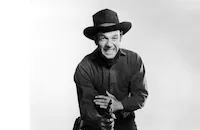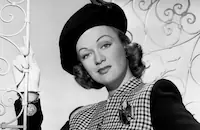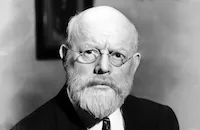Whiplash

Brief Synopsis
Cast & Crew
Lew Seiler
Dane Clark
Alexis Smith
Zachary Scott
Eve Arden
Jeffrey Lynn
Film Details
Technical Specs

Synopsis
During the match for the middleweight boxing championship, Michael Gordon reflects on his recent past as a painter living near San Francisco: A short time earlier, in Mike's hometown, Sam, the owner of a café, sells one of Mike's paintings to a woman named Laurie Rogers. Mike is furious, believing that his painting is worth nothing, and rushes to Laurie's hotel, intending to demand that she return the painting, but her sensitive interpretation of the work convinces him to let her keep it. Mike then asks the attractive Laurie to dinner. By the end of the evening, he has fallen in love with her, but the next day, she checks out of her hotel without leaving a forwarding address. The only clue Mike has to her whereabouts is the name of New York City physician Dr. Arnold Vincent, to whom she has mailed the painting. Sam encourages Mike to go to New York and look for Laurie. There, Mike tries to contact Vincent, who continually refuses to speak to him. One day, Mike's neighbor, Chris Sherwood, invites him to accompany her to the Pelican Club. To Mike's surprise, Laurie is singing there, but when he follows her backstage after her number, she begs him to leave her alone. Later he learns that Laurie is married to Rex Durant, the crippled owner of the club, who had been a boxer before he was injured. Durant is looking for a fighter to train to win the championship, and having seen Mike knock out one of his bodyguards, offers to work with him. At first, Mike turns down the offer, but then accepts it to spite Laurie. When Mike arrives at the gym for his first day of training, he learns that Vincent is the resident doctor and Laurie's brother. Vincent performed a tricky operation on Durant's legs after an auto accident, and Durant now blames him for his inability to walk. Mike takes the name "Mike Angelo" in honor of the Renaissance painter, Michelangelo, and his interest in painting is played up for publicity. When Durant discovers Mike's portrait of Laurie in his apartment, Laurie is forced to admit that she loves Mike. Later, Vincent contemplates killing Durant because he realizes that Laurie has stayed with her husband to prevent him from charging Vincent with malpractice. When Mike learns about Durant's hold on Laurie, he refuses to fight for him, but Durant vows that he will hold Mike to his contract. A struggle breaks out between Mike and Costello, one of Durant's men, and Mike suffers a concussion. When Vincent informs Durant that another fight could mean Mike's death, Durant offers to let Laurie go if he wins the championship. Durant holds Vincent prisoner to prevent his stopping the fight. Mike is badly beaten during the fight, but succeeds in knocking out his opponent before collapsing. An escaped Vincent rushes Mike to the hospital for emergency brain surgery, then threatens to show boxing officials X-ray plates that will prove Durant sent Mike into the ring to be killed. Costello shoots Vincent, and in the ensuing confusion, Durant's wheelchair slips into traffic and he is killed. Mike recovers from his surgery and returns to California and painting. Later, Laurie joins him there, and they are reunited.

Director
Lew Seiler
Cast

Dane Clark

Alexis Smith

Zachary Scott

Eve Arden

Jeffrey Lynn

S. Z. Sakall

Alan Hale

Douglas Kennedy
Ransom Sherman

Fred Steele
Robert Lowell

Don Mcguire
Clifton Young
Sam Hayes
George Nokes
Norman Ollestad
Jimmy Dodd
Charles Marsh
Kate Lawson
Maudie Prickett
I. Stanford Jolley
Jack Worth
Richard Walsh
Tommy Garland
Harvey Perry
Jim O'gatty
John Daheim
Ray Montgomery
Harry Lewis
John Harmon
Wally Scott
Cliff Herd
Mike Lally

Howard Mitchell
Howard Negley
Donald Kerr
Rudy Friml
Larry Mcgrath
Joe Gray
Aldo Spoldi
Ceferino Garcia
George Goodman
John Salvata
Arthur Sullivan
Henry Vroom
Rito Punay
Wally Rose
Larry Anzalone
Paul Baxley
Buddy Wright
Sam Shack
Charles Sullivan
Cy Malis
Sailor Vincent
Gene Delmont
George Suzanne
Joe Labarba

Ray Mcdonald
Morrie Cohan
Ralph Volkie
Bing Conley
Willie Bloom
Alan Mathews
Bill Wallace
Bob Perry
Crew
Milo Anderson
Mushy Callahan
John A. Camacho
Charles H. Clarke
Fausto Curbelo
Mack David
Elmer Decker
Edwin Dupar
Kenneth Earl
Leo F. Forbstein
Harriet Frank Jr.
Maurice Geraghty
William Jacobs
Felix Jacoves
Gordon Kahn
James Leicester
Frank Magee
Peverell Marley
Jack Mcconaghy
William Mcgann
Leonid Raab
Dick Redmond
Dolph Thomas
Franz Waxman
Perc Westmore

Photo Collections
Film Details
Technical Specs

Articles
Whiplash
Dane Clark plays Mike, a talented painter living in a picturesque coastal town near San Francisco. A mysterious woman named Laurie (Alexis Smith) buys one of his paintings, and the two fall in love. But she leaves abruptly, and he follows her to New York. Once there, he finds out that she's married to crippled former boxer Rex Durant (Zachary Scott). After a brawl that proves Mike is as good with his fists as he is with his paintbrush, Mike eventually agrees (to spite Laurie) to accept Durant's offer to train him as a boxer. He even takes as his pugilist name "Mike Angelo," in honor of the Renaissance genius. Then the noir fun begins.
The boxing scenes in Whiplash came easily to Clark -- he had briefly tried boxing as a young man in the 1930s. Like Garfield, Clark so excelled in tough guy roles that it may be surprising to learn that he graduated from Cornell University and attended law school. But during the depression, there were few jobs for lawyers, so he did all kinds of work to make a buck, including boxing, construction, baseball, and modeling. Eventually he drifted into acting, and after achieving some success on the New York stage, Clark was signed by Warner Bros., where he joined the tough-guy roster that included his friend Garfield and Humphrey Bogart, who suggested that he change his name from Bernard Zanville to Dane Clark.
When she appeared in Whiplash, Alexis Smith was seven years into her Warners contract, where her cool elegance had led her to be typecast as aloof socialites, or in "other woman" roles. It also made her ideal for film noir femmes fatales. Smith rarely had an opportunity to show off her singing and dancing talents, and even though she plays a nightclub singer in Whiplash, her voice appears to be dubbed. It wasn't until she starred on Broadway in the 1971 Stephen Sondheim musical Follies that she wowed audiences with her musical skills, and won a Tony.
Zachary Scott was also often typecast, as a suave and ruthless villain. Before he appeared in Whiplash, Warner Bros. had loaned him out for his previous two films, which had given him more dimensional roles. In MGM's Cass Timberlane (1947), he played Spencer Tracy's friend, who falls in love with Tracy's younger wife, Lana Turner. Although Scott played a cad in Ruthless (1948), made for the independent Producing Artists, he was the leading man, and his cad was a complex one. That's not the case in Whiplash, and a review in the Hollywood Reporter noted that "Zachary Scott's melodramatic role is hardly an assignment worthy of the capable actor." Maybe not, but it's always entertaining to watch Scott be nasty.
Whiplash marked one of Jeffrey Lynn's first screen appearances after serving in World War II. For once he wasn't typecast as the bland nice guy he'd been playing since his film debut a decade earlier, in movies such as Four Daughters (1938). His character in Whiplash, a conflicted doctor, gives him a chance to play against type. Part of the fun of the film is the supporting cast, including superb character actors Eve Arden, at her wisecracking best, and S.Z. "Cuddles" Sakall, full of dithery charm. And look for Jimmie Dodd, the grownup Mousketeer of 1950s TV's The Mickey Mouse Club, in a bit part as a piano player.
Whiplash was the second feature film writing credit for Harriet Frank Jr. The daughter of a Hollywood story editor, Frank entered MGM's young writers training program after World War II, where she met her husband and future collaborator, Irving Ravetch. The two did not begin writing together until a decade later. One of their first collaborations was The Long, Hot Summer (1958), which was also the first of eight films the couple made with director Martin Ritt, including Hud (1963) and Norma Rae (1980), both of which earned them Academy Award nominations.
By Margarita Landazuri
Click here to visit the TCM shop if you would like to purchase this DVD.
Director: Lewis Seiler
Producer: William Jacobs
Screenplay: Maurice Geraghty, Harriet Frank Jr.
Cinematography: Peverell Marley
Editor: Frank Magee
Costume Design: Milo Anderson
Art Direction: Charles H. Clarke
Music: Franz Waxman
Principal Cast: Dane Clark (Michael Gordon), Alexis Smith (Laurie Rogers Durant), Zachary Scott (Rex Durant), Eve Arden (Chris Sherwood), Jeffrey Lynn (Dr. Arnold Vincent), S.Z. Sakall (Sam), Alan Hale (Terrence O'Leary), Douglas Kennedy (Costello), Jimmie Dodd (Bill the piano player)
89 minutes

Whiplash
Quotes
Trivia
Notes
The first title card was missing on the viewed print.















